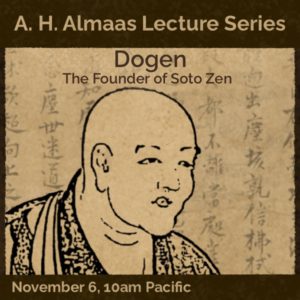
A.H. Almaas Lecture Series
Dogen: The Founder of Soto Zen in Japan
Date/Time: November 6, 10am-12:00pm Pacific
 In 1228 CE, the Japanese monk Dogen returned to his homeland from China, where he had lived for four years and received Dharma transmission from the Buddhist master Rujing. Dogen went on to introduce the practice of zazen in Japan and founded the school of Soto Zen, which, 800 years later, flourishes worldwide.
In 1228 CE, the Japanese monk Dogen returned to his homeland from China, where he had lived for four years and received Dharma transmission from the Buddhist master Rujing. Dogen went on to introduce the practice of zazen in Japan and founded the school of Soto Zen, which, 800 years later, flourishes worldwide.
Dogen’s teachings diverged starkly from the Tendai Buddhist training he had received before going to China. That school promoted the doctrine of original enlightenment, which claimed that because humans are enlightened by nature, we cannot achieve enlightenment through practice. Dogen disagreed. As he wrote, “Practice is realization and realization is practice.”
Dogen’s writings about realization and awakening were revelatory and they remain so, not being easily understood even by teachers of Zen. In this lecture, Almaas will investigate some of the realizations Dogen introduced that are not commonly known or understood by most of the spiritual community in the west; it will be useful for many to recognize the greater horizons that our spiritual nature can open.
The lecture will last approximately 75 to 90 minutes followed by a question and comment period.
About the Speaker
 A. Hameed Ali was born in Kuwait in 1944. At the age of eighteen, he moved to the US to study at the University of California in Berkeley. Hameed was working on his PhD in physics when he reached a turning point in his life and destiny that led him to inquire into the psychological and spiritual aspects of human nature rather than the physical nature of the universe. He left the academic world to pursue an in-depth journey of inner discovery, applying his scientific precision and discipline to personal, experiential research. This included study with different teachers in different modalities, extensive reading, and continuous study of his own consciousness in an effort to understand the essential nature of human experience and reality in general. Hameed’s process of exploration led to the creation of the Ridhwan School and, with Karen Johnson, resulted in the founding and unfoldment of the Diamond Approach. He is an author of over 19 different books.
A. Hameed Ali was born in Kuwait in 1944. At the age of eighteen, he moved to the US to study at the University of California in Berkeley. Hameed was working on his PhD in physics when he reached a turning point in his life and destiny that led him to inquire into the psychological and spiritual aspects of human nature rather than the physical nature of the universe. He left the academic world to pursue an in-depth journey of inner discovery, applying his scientific precision and discipline to personal, experiential research. This included study with different teachers in different modalities, extensive reading, and continuous study of his own consciousness in an effort to understand the essential nature of human experience and reality in general. Hameed’s process of exploration led to the creation of the Ridhwan School and, with Karen Johnson, resulted in the founding and unfoldment of the Diamond Approach. He is an author of over 19 different books. Registration Information
Lecture: Dogen: The Founder of Soto Zen in Japan
Date/Time: November 6, 10am-12:00pm Pacific
The A.H. Almaas Lecture Series was made possible by a generous donor.
If you would like to support free programs like this one, you can make a contribution here. Please write “A.H. Almaas Lecture Series” in the Notes section. The Ridhwan Foundation does not provide financial or tax advice. Please contact your financial advisor regarding tax deductions.
This lecture is one part of a six-part series. If you would like to explore similar programs, you can view the entire series.
Please direct all registration-related questions to the Ridhwan Foundation Communications Team at outreach@ridhwan.org.
Connect with us on social media! Follow us on Facebook and Instagram for all the latest information about the A.H. Almaas Lecture Series.

Privacy Policy | Terms & Conditions
© Copyright Diamond Approach, Ridhwan School – All rights reserved.